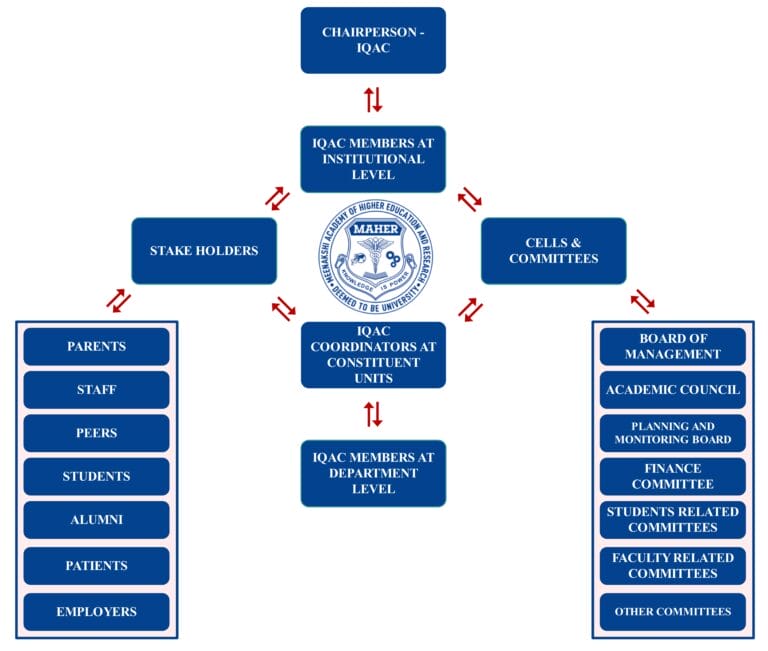Structure and Mechanism of Functioning
The Internal Quality Assurance Cell of Meenakshi Academy of Higher Education and Research plays a pivotal role in quality initiatives, quality improvement and quality sustenance at the institution. The Internal Quality Assurance Cell of MAHER was established in 2012 and became proactive following the first cycle of NAAC Accreditation in 2015. The IQAC of MAHER was reconstituted as per the recommendations of the NAAC. The Vice Chancellor is the Chairperson of the IQAC while the IQAC Coordinator/Director IQAC reports to the Chairperson and ensures smooth functioning of the IQAC by coordinating with the stakeholders.
The IQAC occupies a unique position in the administrative set-up of the institution. Being the watchdog of quality initiatives of the institution, IQAC takes the dynamic role. While being an integral part of the administrative set-up of the institution, IQAC also simulates the position of an external agency while monitoring or evaluating the progress of the quality initiatives. While the actions of the IQAC is bound by the Statutory bodies such as the Board of Management and the Academic Council, the IQAC also has the powers to recommend quality initiatives to these statutory governing bodies of the institution.
Structure: The IQAC is headed by the Vice Chancellor of the Institution. At MAHER, the IQAC at the HEI level has representation from all stakeholders including the Heads of the Constituent Colleges, IQAC coordinators of the Constituent Colleges, Representatives from alumni, students, staff of all cadre, administrative staff and employers of the graduates from MAHER. In addition to this, the IQAC also has External Experts who are distinguished educationist and are well acquainted with the process and functioning of IQAC. The IQAC convenes four times in a year as suggested by the NAAC and deliberates on various quality initiatives.
The IQAC at the level of the institution takes opinions and suggestions from the IQAC which functions at the level of the constituent units. Further, various cells and committees that function both at institution level as well as constituent college level play an important role in implementing the initiatives of the IQAC. The IQAC considers the inputs obtained from the stakeholders while drafting the plan of action.
The IQAC in collaboration with Board of Management, Academic Planning and Planning and Monitoring Board proposed the strategic plan of the institution “MAHER ASPIRE 2025” in 2016. Conscious efforts are made to reach the target. Smaller targets are fixed for each quarter of the academic year and a person or a committee is made responsible for completing the particular task. The follow-up and monitoring of the progress are reported in the subsequent meetings of the IQAC.
The IQAC adopts both top down approach as well as bottom up approach for communication and execution of work. For instance, the IQAC seeks feedback from all stakeholders including students, alumni, teachers, patients, parents, employers on various issues. This method of communication which follows bottom up approach is essential for collecting the necessary data which acts as the inputs to draw strategies for future. On the other hand, the IQAC also works as per the directions of the statutory governing councils like the Board of Management thereby following the top down approach. Decentralization of duties/responsibilities as well as power is adopted for successful implementation of various initiatives. This is reflected in the organogram of the institute.
Mechanism of Internal Quality of Assurance Cell

The mechanisms adopted by IQAC for quality assurance are as follows:
- Regular submission of Annual Quality Assurance Report
- Regular conduct of Academic and Administrative Audit
- Submission to National Rankings including NIRF
- Submission to Accreditation including NABL, NABH, ISO
- Submission to Audits including Energy Audit, Environmental Audit,
- Formation of Committees and Cells to ensure decentralization
- Regular submission of data in the University Academic Monitoring Portal of the University Grants Commission
- Periodic review of the curriculum in the Board of Studies and Academic Council
- Self-appraisal of the performance by the faculty members
- Planning the academic activities and adherence to the Academic Calendar
- Obtaining Feedback from stakeholders on various aspects including curriculum
- Appointment of external members in various cells and committees to maintain transparency
- Collaboration with external agencies of National and International repute to maintain high standards
- Regular conduct of Internal and External Financial Audit
- Introduction of E-governance for having a complete track-record of all spheres of governance
- Decentralization at all levels to ensure efficiency, transparency and accountability
- Representation of pertinent stakeholders in various committees and cells to ensure transparency
- Maintenance of multiple means of recording grievances and its prompt redressal
- Appointment of Adjunct Faculty and Visiting Faculty from National and International arena to maintain high standards in education
- Validation of reports of Clinical, Clinical Biochemistry and Blood bank through External Quality Assurance Scheme with CMC Vellore. Similarly, validation of reports of Clinical Pathology through External Quality Assurance Scheme with AIIMS, Delhi for Pathology.

